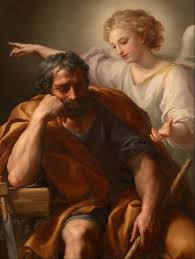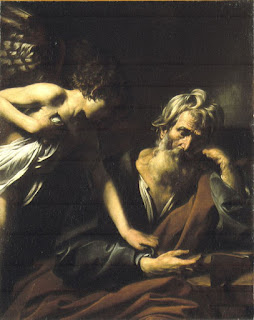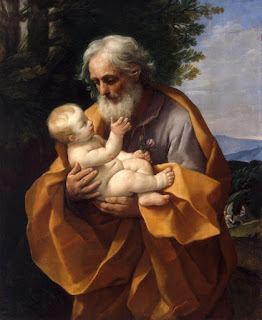
For Tuesday's Feast of St Joseph, I wanted to repost something I put up a couple of years ago because it reflected an important step in my own appreciation of St Joseph.
[[Friday's readings (December 2015) focused on the coming of the One in whom justice will be done and creation set to rights. Jeremiah speaks of this in terms of the Davidic line of Kings --- a line that often profaned and betrayed God's sacred promise and hope. The psalmist sings wonderfully of the promise of the Lord bringing all things to right in the love of God.
But especially poignant is the Matthean story of Joseph as the icon of one who struggles to allow God's own justice to be brought to birth as fully as possible. It is, in its own way, a companion story to Luke's account of Mary's annunciation and fiat. Both Mary (we are told explicitly) and Joseph (we are told implicitly) ponder things in their hearts, both are mystified and shaken by the great mystery which has taken hold of them and in whose story they have become pivotal characters. Both allow God's own power and presence to overshadow them so that God might do something absolutely new in their world. But it is Joseph's more extended and profound struggle to truly do justice in mercy and to be a righteous man who reveals God's own justice in love, God's salvation, that was at the heart of yesterday's . . . story.
The Situation:I am a little ashamed to say I have never spent much time considering Joseph's predicament or the context of that predicament until this week. Instead I have always thought of him as a good man who chose the merciful legal solution rather than opting for the stricter one. I never saw him making any other choice nor did I understand the various ways he was pushed and pulled by his own faith and love. But Joseph's situation was far more demanding and frustrating than I had ever appreciated! Consider the background which weighed heavy on Joseph's heart. First, he is identified as a just or righteous man, a man faithful to God, to the Covenant, a keeper of the Law or Torah, an observant Jew who was well aware of Jeremiah's promise and the sometimes bitter history of his own Davidic line. All of this and more is implied here by the term "righteous man". In any case, this represents his most foundational and essential identity. Secondly, he was betrothed to Mary, wed (not just engaged!) to her though he had not yet taken her to his family home and would not for about a year. That marriage was a symbol of the covenant between God and his People Israel. Together he and Mary symbolized the Covenant; to betray or dishonor this relationship was to betray and profane the Covenant itself. This too was uppermost in Joseph's mind precisely because he was a righteous man.

Thirdly, he loved Mary and was entirely mystified by her pregnancy. Nothing in his tradition prepared him for a virgin birth. Mary could only have gotten pregnant through intercourse with another man so far as Joseph could have known --- and this despite Mary's protestations of innocence. (The OT passage referring to a virgin is more originally translated as "young woman". Only later as "almah" was translated into the Greek "parthenos" and even later was seen by Christians in light of Mary and Jesus' nativity did "young woman" firmly become "a virgin".) The history of Israel was fraught with all-too-human failures which betrayed the covenant and profaned Israel's high calling. While Joseph was open to God doing something new in history it is more than a little likely that he was torn between which of these possibilities was actually occurring here, just as he was torn between believing Mary and continuing the marriage and divorcing her and casting her and the child aside.
What Were Joseph's Options?Under the Law Joseph had two options. The first involved a very public divorce. Joseph would bring the situation to the attention of the authorities, involve witnesses, repudiate the marriage and patrimony for the child, and cast Mary aside. This would establish Joseph as a wronged man and allow him to continue to be seen as righteous or just. But Mary could have been stoned and the baby would also have died as a result. The second option was more private but also meant bringing his case to the authorities. In this solution, Joseph would again have repudiated the marriage and patrimony but the whole matter would not have become public and Mary's life or that of the child would not have been put in immediate jeopardy. Still, in either instance, Mary's shame and apparent transgressions would have become known and in either case, the result would have been ostracization and eventual death. Under the law Joseph would have been called a righteous man but how would he have felt about himself in his heart of hearts? Would he have wondered if he was just under the Law but at the same time had refused to hear the message of an angel of God, refused to allow God to do something new and even greater than the Law?
Of course, Joseph might have simply done nothing at all and continued with the plans for the marriage's future. But in such a case many problems would have arisen. According to the Law, he would have been falsely claiming paternity of the child --- a transgression of the Law and thus, the covenant. Had the real father shown up in the future and claimed paternity Joseph would then have been guilty of "conniving with Mary's own sin" (as Harold Buetow describes the matter). Again Law and covenant would have been transgressed and profaned. In his heart of hearts, he might have believed this was the just thing to do but in terms of his People and their Covenant and Law, he would have acted unjustly and offended the all-just God. Had he brought Mary to his family home he would have rendered them and their abode unclean as well. If Mary was guilty of adultery she would have been unclean --- hence the need for ostracizing her or even killing her!
Entering the Liminal Place Where God May Speak to Us:
All of this and so much more was roiling around in Joseph's heart and mind! In one of the most difficult situations we might imagine, Joseph struggled to discern what was just and what it would mean for him to do justice in our world! Every option was torturous; each was inadequate for a genuinely righteous man. Eventually he came to a conclusion which may have seemed the least problematical even if it was not wholly satisfactory, namely to put Mary away "quietly", to divorce her in a more private way and walk away from her. And at this moment, when Joseph's struggle to discern and do justice has reached it's most neuralgic point, at a place of terrible liminality symbolized in so much Scriptural literature by dreaming, God reveals to Joseph the same truth Mary has herself accepted: God is doing something unimaginably new here. He is giving the greatest gift yet. The Holy Spirit has overshadowed Mary and resulted in the conception of One who will be the very embodiment of God's justice in our world. Not only has a young woman come to be pregnant but a virgin will bear a child! The Law will be fulfilled in Him and true justice will have a human face as God comes to be Emmanuel in this new and definitive way.
Joseph's faith response to God's revelation has several parts or dimensions. He decides to consummate the marriage with Mary by bringing her to his family home
but not as an act of doing nothing at all and certainly not as some kind of sentimental or cowardly evasion of real justice. Instead, it is a way of embracing the whole truth and truly doing justice. He affirms the marriage and adopts the child as his own. He establishes him in the line of David even as he proclaims the child's true paternity. He does this by announcing this new Son's name to be Jesus, God saves. Thus Joseph proclaims to the world that God has acted in this Son's birth in a new way
that transcends and relativizes the Law even as it completely respects it. He honors the Covenant with a faithfulness that leads to that covenant's perfection in the Christ Event. In all of this, Joseph continues to show himself to be a just or righteous man, a man whose humanity and honor we ourselves should regard profoundly.
Justice is the way to Genuine Future:Besides being moved by Joseph's genuine righteousness, I am struck by a couple of things in light of all of this. First, discerning and doing justice is not easy. There are all kinds of solutions in the Scriptures that are partial and somewhat satisfactory, but real justice takes work and, in the end, must be inspired by the love and wisdom of God. Secondly, Law
per se can never really mediate justice. Instead, the doing of justice takes a human being who honors the Law, feels compassion, knows mercy, struggles in fear and trepidation with discerning what is right, and ultimately is open to allowing God to do something new and creative in the situation. Justice is never a system of laws, though it will include these. It is always a personal act of courage and even of worship, the act of one who struggles to mediate God's own plan and will for all those and that involved. Finally, I am struck by the fact that justice opens reality to a true future. Injustice closes off the future. In all of the partial and unsatisfactory solutions Joseph entertained and wrestled with, each brought some justice and some injustice. Future of some sort was assured for some and foreclosed to others; often both came together in what was merely a sad and tragic approximation of a "real future". Only God's own will and plan assures a genuine future for the whole of his creation. That too is something yesterday's Gospel witnessed to.
Another Look at Joseph:
Joseph is the star in Matt's account, the one who points to God and the justice only God can do. It is important, I think, to see all that he represents as Mary's counterpart in the nativity of Jesus (Son of David) who is Emmanuel (Son of the One who, especially in Jesus, is God With Us). Mary's fiat seems easy, and graceful in more than one sense of that term. Joseph's fiat is hard-won but also graced or graceful. For Joseph, as for Mary, there is real labor involved as the categories of divinity and justice, law, and covenant are burst asunder to bring the life and future of heaven to birth in our world. May we each be committed to mediating God's own justice and bringing God's future into being especially in this Lenten-Easter season. This is the time when we especially look ahead to Christ's coming and too, to his eventual coming to full stature when God will be all in all. May we never take refuge in partial and inadequate solutions to our world's problems and need for justice, especially out of shortsightedness, sentimentality, cowardice, evasion, or fear for our own reputations. And may we allow Joseph to be the model of discernment, humility, and courage in mediating the powerful presence and future of God we recognize as justice and so yearn for in this 21st Century.]]
Postscript 2024: in a conversation with a friend on a liturgy her house had had last year on the Feast of St Joseph, she described a question that had been asked all the Sisters; each then shared her own answer if she chose to. The question was what characteristic do you need to ask Joseph for assistance with this year. My own answer for the present was patience in trusting God when the way we're moving is unclear or we don't understand what God is doing with or asking from us. My friend's answer a year ago was Help in Trusting God in times of uncertainty. I think she will repeat the same prayer this year. Readers might try something similar.
 During Holy Week, we recall and celebrate the central events of our faith, revealing just how deep and incontrovertible is God's love for us. It is the climax of a story of "self-emptying" (or self-bestowal) on God's part begun in creation and completed in the events of the cross. In Christ, and especially through his openness and responsiveness (i.e., his obedience) to the One he calls Abba, God enters exhaustively into every aspect of our human existence and in no way spares himself the cost of such solidarity. Here God is revealed as an unremitting Love-in-Act which pursues us without pause or limit. Even our sinfulness cannot diminish or ultimately confound this love. Nothing, the gospel proclaims, will keep God from embracing and bringing us “home” to Himself. As the Scriptures remind us, our God loves us with a love that is “stronger than death." It is a love from which, “Neither death nor life, nor powers nor principalities, nor heights nor depths, nor anything at all” can ultimately separate us! (Romans 8:38-39)
During Holy Week, we recall and celebrate the central events of our faith, revealing just how deep and incontrovertible is God's love for us. It is the climax of a story of "self-emptying" (or self-bestowal) on God's part begun in creation and completed in the events of the cross. In Christ, and especially through his openness and responsiveness (i.e., his obedience) to the One he calls Abba, God enters exhaustively into every aspect of our human existence and in no way spares himself the cost of such solidarity. Here God is revealed as an unremitting Love-in-Act which pursues us without pause or limit. Even our sinfulness cannot diminish or ultimately confound this love. Nothing, the gospel proclaims, will keep God from embracing and bringing us “home” to Himself. As the Scriptures remind us, our God loves us with a love that is “stronger than death." It is a love from which, “Neither death nor life, nor powers nor principalities, nor heights nor depths, nor anything at all” can ultimately separate us! (Romans 8:38-39) To say that Christ died what the New Testament refers to as sinful, godless, “eternal”, or “second death” is to say that through his passion Jesus entered this abyss and bore the full weight of human isolation and abandonment. In this abject loneliness and hopelessness --- a hell deeper than anyone has ever known before or will ever know again --- Christ, though completely powerless to act on his own, remains open and responsive (obedient) to God. This openness provides God with a way into this state or place from which he is otherwise excluded. In Christ, even godforsakenness becomes good soil out of which the fullness of resurrection life springs. As a result, neither sin nor death will ever have the final word, or be a final silence! God will not and has not permitted it!
To say that Christ died what the New Testament refers to as sinful, godless, “eternal”, or “second death” is to say that through his passion Jesus entered this abyss and bore the full weight of human isolation and abandonment. In this abject loneliness and hopelessness --- a hell deeper than anyone has ever known before or will ever know again --- Christ, though completely powerless to act on his own, remains open and responsive (obedient) to God. This openness provides God with a way into this state or place from which he is otherwise excluded. In Christ, even godforsakenness becomes good soil out of which the fullness of resurrection life springs. As a result, neither sin nor death will ever have the final word, or be a final silence! God will not and has not permitted it!


















































